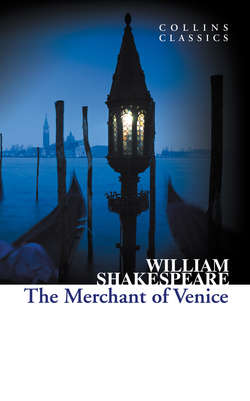Читать книгу The Merchant of Venice - Уильям Шекспир, William Szekspir, the Simon Studio - Страница 10
INTRODUCTION
ОглавлениеIn March 1814, Jane Austen took her niece to see Edmund Kean perform in The Merchant of Venice, ‘a good play for Fanny – she cannot be much affected, I think’. Perhaps she considered comedy less likely than tragedy to arouse strong passions. Times have changed. There can be no question now as to this play’s ability to kindle late-twentieth-century emotions. One recent essay brands it ‘profoundly and crudely anti-Semitic’ (Cohen, 1988).
Opposing views of The Merchant of Venice take their cue from the play’s rival centres of control, for it is a drama with two directors, each pulling strongly for different generic destinations. Shylock will have a tragic melodrama, with himself as knife-whetting villain and Antonio as victim. The latter indeed seems not unattracted to a role which allows him a momentary centrality denied him in the rest of the play. Portia, on the other hand, manoeuvres the plot and its characters inexorably towards a comic resolution.
On the structural level The Merchant of Venice unquestionably is a comedy. It contains all the standard elements: lyrical courtship, fairy-tale plot, obstructions to overcome, and a happy ending in the escapist world of Belmont. But as it proceeds, the play invites us to reassess our opinions, to revalue the very conventions on which it builds. Romance is both glamorous and superficial. We are assailed by the discrepancy between what is reported (Shylock ludicrously confusing daughter and ducats) and what is seen (Shylock grieving over memories of a ring), between expectation and disappointment (a masque is arranged only to be abandoned at the last moment). Nor can we overlook the niggling co-existence of the attractive and the repellent: Bassanio is lover and thoughtless spendthrift, Antonio respected merchant and anti-Semite, Portia intelligent heroine and calculating deceiver. But Shylock himself is the play’s sternest challenge to comic optimism.
The growing tension between light comedy and something darker is reflected in the contest between speech styles which comes to a head in the trial scene (4.1). The language of up-market Venice and Belmont draws on the earlier comedies and the Sonnets: a rhetoric of romance, chiselled metaphor and self-conscious wit. Against this Shylock articulates a slow, gritty language of almost scientific precision, fiscal prudence, and grave austerity. The Duke’s conciliatory words aim to steer him from vengeance to mercy by means of the rhetoric of public approbation and veiled threat: the world, he insists, looks for ‘remorse’, ‘human gentleness and love’, ‘an eye of pity’, ‘tender courtesy’, and ‘a gentle answer’. Othello, another outsider in Renaissance Italy, has deliberately cultivated the Venetian graces: Shylock, just as resolutely, has not. His ‘answer’ (a word he reiterates like a remorselessly prodding finger) would wither any olive branch. A wilfully ugly diction, barren of metaphor, displays his contempt for Venetian elegance: ‘rat’, ‘gaping pig’, ‘cat’, ‘bagpipe’, ‘urine’ – these are his verbal counters. And Antonio putrifies before our very eyes into ‘a weight of carrion flesh’. While the young lovers in the play happily discover both romance and riches, Shylock proves unexpectedly indifferent to financial gain. All he has is ‘a lodged hate and a certain loathing’ – inexplicable and therefore beyond the reach of rational, economic or emotional appeal. His proud Jewish separatism divorces him not only from Venetian vocabulary but ultimately from common humanity.
Such malevolence should settle our loyalties. Yet it is not as simple as that. Shylock’s exclusion from the glittering society of the play brings him strangely closer to the audience. Comedy conventionally distances so as to highlight large-scale patterns and social groupings. But Shylock, alienated by voice and profession, race and religion, stands nearer to a century equally uncertain about the values of Renaissance civilisation. And the play’s refusal to become his tragedy isolates him further: not a tragic Jew, but one despoiled, cheated, deprived of dramatic weight, robbed finally of any function in a play which proceeds calmly without him. If Antonio is not to be the lamb for the slaughter, then Shylock must be the scapegoat. There is always a cost: even comedy must expel its dissidents.
Thus the final Act retreats doggedly into a beautiful but brittle fantasy world where lovers unite, fathers relent, games conclude, and ships come home. The play which began with ‘a lady richly left’ ends aptly with the news of a deed of gift ‘from the rich Jew’. The symmetry is ironic. Reduced by the triumphant Portia into an off-stage benefactor Shylock becomes part of the mechanism of the comic world. But that world will never be quite the same again. Unlike Fanny, we cannot but be much affected.
